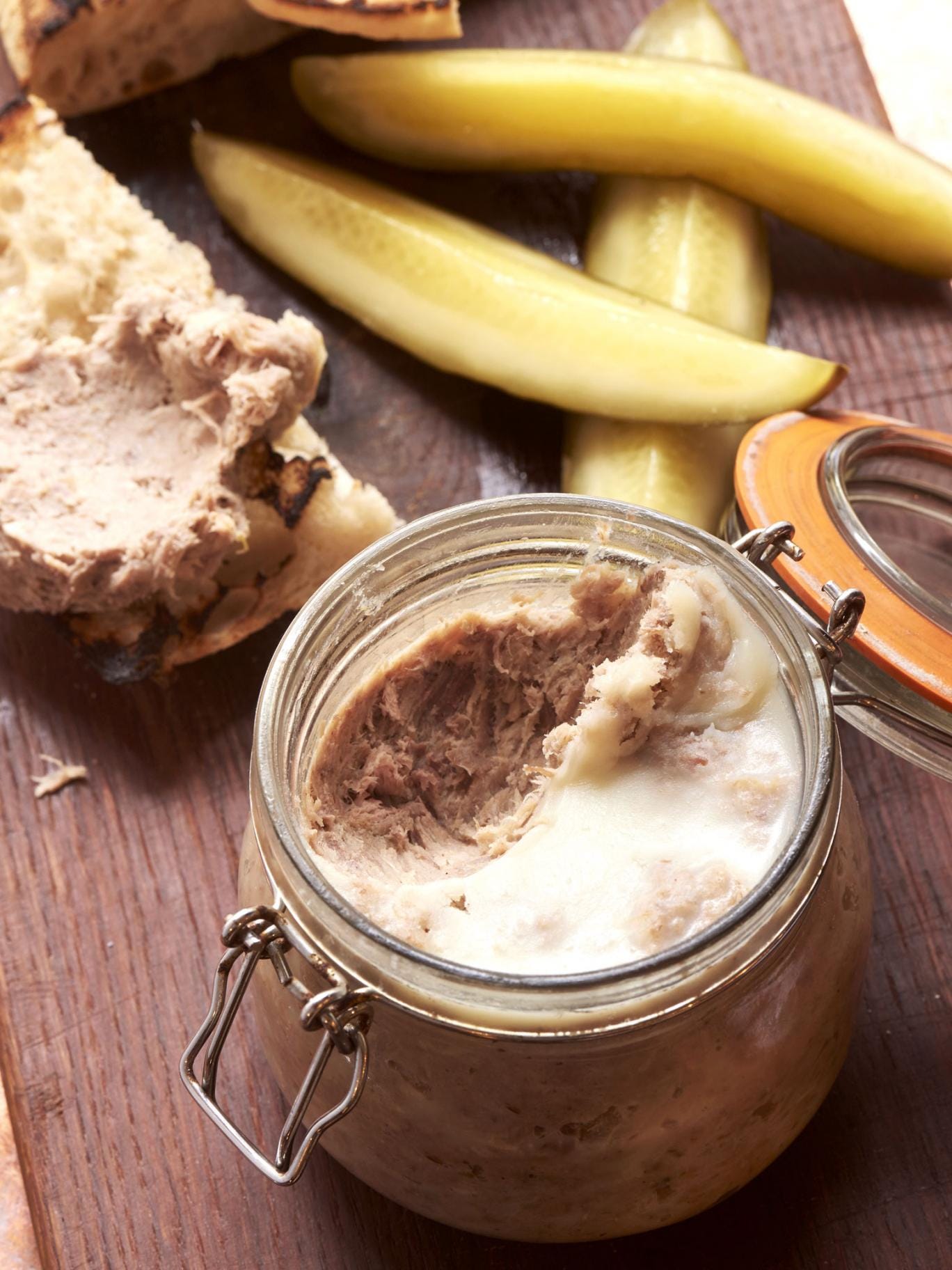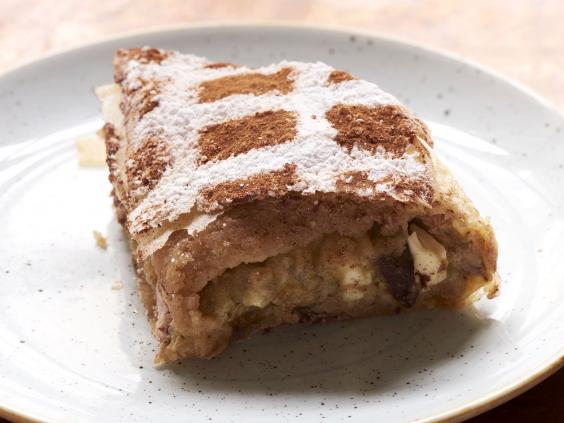Mark Hix recipes: Our chef turns game into rich winter treats
-
Mark Hix recipes: Our chef turns game into rich winter treats | Features | Lifestyle | The Independent
http://www.independent.co.uk/life-style/food-and-drink/features/mark-hix-recipes-our-chef-turns-game-into-rich-winter-treats-a6864376.html
Game is a great dish for this time of year, from rillettes to wild duck pastilla
Mark Hix @HixRestaurants Saturday 13 February 2016

Game Rillettes are handy as a starter for a dinner party, or to take on a picnic, shoot or fishing trip Joe WoodhouseI'm in the fortunate position of being able to acquire game during the shooting season, which I then store in the freezer. I normally just quickly pull the feathers and skin away from the flesh on the carcass, then freeze the breasts, thighs, and drumsticks separately, to make rich winter treats such as the ones below. This is what we have butchers for, but whatever way you prep it, game is a great dish for this time of year.
Game rillettes
Serves 6-8
Rillettes are always handy as a standby snack or a starter for a dinner party, or to take on a picnic, shoot or fishing trip.
500g game meat, cut into 2-3 cm chunks
500g pork belly, rind and bones removed, cut into 2-3cm chunks
200g duck fat
5 cloves of garlic, peeled and crushed
½tsp ground nutmeg
2tsp freshly ground black pepper
2tsp flaky sea salt
2 bay leaves
6 juniper berries, roughly chopped
1tbsp fresh thyme leavesPreheat the oven to 150C/gas mark 2. Put all the ingredients into a heavy-bottomed ovenproof dish with a lid, pour in 150ml of cold water and gently bring the contents of the pan up to a simmer. Cover with a lid and put into the oven for 3-3½ hours. Stir occasionally and add a little more water if the liquid has evaporated. The rillettes are done when the meat is falling apart.
Empty the contents of the pan into a colander or sieve over a bowl. Allow to cool a little and remove the bay leaves.
With a fork or very clean fingers break up the pieces of meat into shreds; any large remaining pieces of fat will have to be chopped up with a knife or broken up in a blender. Transfer to a clean bowl, then mix in enough of the strained fat to form a creamy paste. Add a little more salt and pepper if required.
Transfer the mix into sterilised preserving vessels such as Kilner jars. Spoon a little more fat on top and seal. Refrigerate for up to six months.
Wild duck pastilla
Serves 4
If you've been to Morocco you may have come across pastilla. It is their native pie, usually made with pigeon along with almonds, sugar and cinnamon – which may have originally been used to disguise the gaminess of the birds.
2-3 wild ducks with the meat removed from the carcass, skinned and cut into rough 1-2cm chunks
Bones from the duck carcass
1ltr chicken stock (or use a quality cube)
6tbsp olive oil
1 medium onion, finely chopped
4 cloves of garlic, peeled and crushed
A good pinch of saffron
1tsp powdered ginger
1tbsp chopped parsley
1tbsp chopped coriander
1tsp freshly ground black pepper
1tsp salt
1tbsp icing sugar
100g butter
About 20-24 warka pastry leaves or sheets of filo pastry, about 18cm square
60g melted butter
5 hard-boiled eggs, choppedFor the sugared-almond mixture
350g ground almonds
5tbsp icing sugar
3tbsp orange-flower water or 4tbsp water
1/2tsp ground cinnamonTo serve
Icing sugar
Ground cinnamonPreheat the oven to 200C/gas mark 6. Chop the duck bones and simmer them gently in the chicken stock for 45 minutes. Strain the stock through a fine-meshed sieve and discard the bones.
Heat the olive oil in a heavy-bottomed pan, and fry the pieces of duck for a couple minutes on a high heat until nicely coloured, stirring every so often. Add the onion, garlic, saffron, ginger, parsley, coriander, pepper and salt, and stir well. Add the strained stock, bring to the boil and simmer very gently for 30 minutes. Add the tablespoon of icing sugar and the 100g of butter and simmer for another 20 minutes. The meat should be tender now and the cooking liquid quite rich and flavoursome, and just coating the meat. If not, simmer a little longer. Break the meat up a little into the sauce with the back of a spoon and leave to cool.
To assemble the pastilla, first take a straight-sided tart or cake tin with a removable base (or a bottomless flan ring on a baking tray) measuring 18-20cm across by 5-6cm or more deep. Brush the bottom and sides with some of the 60g of melted butter. Lay a square of pastry on the base. Then lay on another 5 sheets all round the tin, overlapping the central sheet on the base, then going up the sides of the tin so half the sheet overhangs the edge ready to be folded over later.

Mark-Hix-Joe-Woodhouse.jpg
Mark has swapped pigeon for duck in his pastilla (Joe Woodhouse)
Mix together all the ingredients for the sugared-almond mixture and spread half of it on the base of the pastry, leaving about 1cm around the edges. Place 2 more sheets of pastry over the sugared almond mixture. Mix the chopped eggs with the duck mixture and spoon all the filling over the pastry.Cover with 2 more leaves of pastry. Spoon the rest of the almond mixture over the pastry then cover with a couple more leaves. Brush with more butter and fold the overhanging sides up and towards the middle. Cover with one more sheet and firm down the top with your hands.
Bake the pastilla in the oven for about 20 minutes until golden brown. Carefully run a knife around the edge to loosen the sides, and place a serving dish or flat plate upside down over the tin. Carefully invert the pastilla on to the plate and then slide on to a baking tray or the base of the tart tin without the sides.
READ MORE
Mark Hix celebrates Bramley Apple Week
Mark Hix recipes: There's more to going green than boiled cabbage
Mark Hix recipes: Our chef shows how to make chicken interesting
Mark Hix recipes: Our chef cooks with pulses
Mark Hix pairs celery with Cumbrian ham and Dorset Blue Vinney
Mark Hix recipes: Dumplings are the perfect, warming comfort food
Brush all over with melted butter, return to the oven and cook for a further 15 minutes. If it's browning too much, cover with foil and turn the oven down.Remove from the oven and leave to cool a little. Then, using a fish slice, carefully transfer to a serving dish. Cut some long strips of paper about 1cm wide. Dust the top, preferably with a dredger or fine sieve, with some icing sugar then lay the strips a couple of centimetres apart and dredge with the cinnamon to create brown and white stripes. Serve hot cut into wedges.
Planning ahead tip: you can cook the filling for this a couple days in advance and assemble just before cooking.
Polenta with game ragu
Serves 4
You can use any game for this wonderfully hearty dish, perfect for February.
A few tablespoons of vegetable oil
300g game meat in a rough 1cm dice
1 large onion, peeled and finely chopped
4 cloves of garlic, peeled and crushed
100g pancetta or smoked streaky bacon, cut into a rough 1cm dice
1tbsp plain flour
2tsp tomato purée
2 sticks of celery, peeled if necessary and cut into a rough 1cm dice
1tsp chopped thyme or oregano leaves
100ml red wine
750ml hot beef stock
1 small can of chopped tomatoesFor the polenta
750ml milk
1 clove of garlic, peeled and crushed
1 bay leaf
Salt and freshly ground white pepper
A pinch of nutmeg
75 g quick cooking polenta
100 ml double cream
75 g freshly grated parmesanHeat a little vegetable oil in a large, heavy frying pan. Season the game meat and fry in a couple of batches on a high heat for 3–4 minutes until nicely coloured, then add the onion, garlic and pancetta and continue cooking for 3–4 minutes without colouring. Stir in the flour and cook on a low heat for a minute. Stir in the tomato purée, celery and thyme, then gradually add the red wine, beef stock and tomatoes, stirring constantly to avoid lumps forming. Bring to the boil, season, lower the heat and simmer gently for about an hour or until the meat is tender.
READ MORE
Mark Hix recipes: Our chef shows how to make chicken interesting
Meanwhile bring the milk to the boil in a thick-bottomed pan, then add the garlic, bay leaf, salt and pepper and nutmeg.Simmer for 5 minutes then whisk in the polenta and cook on a low heat for about 10 minutes, stirring every so often so that it doesn't stick to the bottom of the pan. A simmering plate is useful for this. Add the cream and parmesan and cook for a further 5 minutes. To serve, spoon the polenta on to warmed serving plates and spoon the game ragu on top